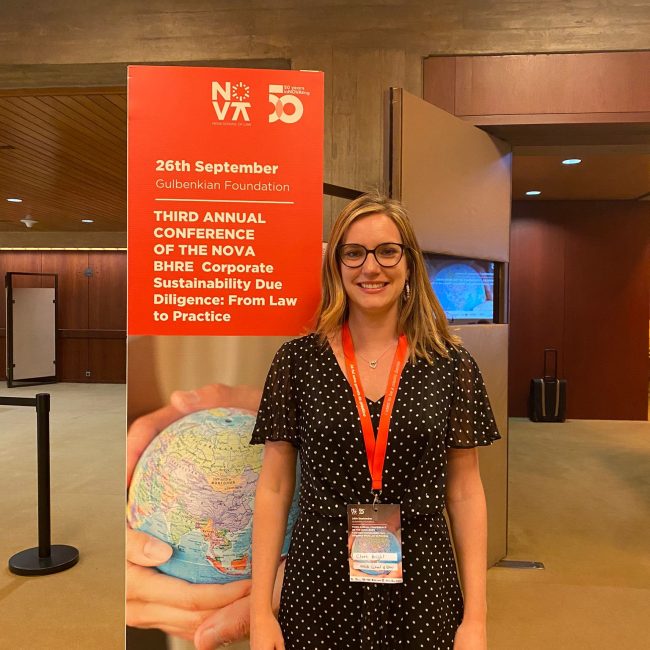
Corporate Sustainability Due Diligence: upholding Human Rights and Environmental standards in Global value Chains
NOVA School of Law
Investigador: Claire Bright
Principal Área Científica: Social Sciences
Tipos de Impacto: Social Impact
ODS: 4, 5, 7, 8, 12, 13; 14, 15, 16 and 17
Metas dos ODS: 4.4; 4.5;5.1; 7.1; 7.a; 7.b; 8.3; 8.5; 8.7; 8.8; 12.5; 12.6; 12.7; 12.8; 12.a; 12.b; 12.c; 13.3; 13.b; 14.1; 14.3; 14.6; 14.b; 15.1; 15.2; 15.3; 15.4; 15.5; 16.2; 16.3; 16.5; 16.b; 17.7; 17.8; 17.18
Claire Bright’s research helped shape the EU Corporate Sustainability Due Diligence Directive (effective since July 25, 2024), requiring large companies to address human rights and environmental impacts.
NOVA BHRE influenced legislation in Germany and Belgium and supported the development of Portugal’s and Tunisia’s first National Action Plans on Business and Human Rights.
Provided training to companies and government officials on sustainable and responsible practices, including workshops in Portugal, Tunisia, and Mozambique.
NOVA BHRE serves as a catalyst for transforming companies into sustainability leaders, fostering collaboration across various sectors.
The awareness of the crucial need to address corporate-related adverse human rights and environmental impacts (including climate change) has increased dramatically in recent years. Surprisingly, still today, there is no legal obligation for companies to respect human rights at the international level, and it is widely considered that existing international instruments only create direct legal obligations for states, and not for companies.
Traditionally, companies’ operations have been mostly subjected to the local norms of the countries in which they operate, which are often weak or insufficient or not properly implemented, and therefore unable to uphold international standards. Such regulatory gap led to a permissive legal environment in which human rights and environment abuses proliferated. Examples include the 160 million children (1 child out of 10 at the global scale) that are in situation of child labour, with about half of them between 7 and 11 years old and working in hazardous conditions; the nearly 18 million people that are in situation of forced labour in the private sector, and more generally, the widespread issues around the poor health and safety standards as well as the working conditions of workers in global supply chains, amongst many others. In addition, issues around corporate-related pollution and deforestation are becoming more widespread, and the adverse effects of climate change are increasing in frequency intensity. According to the World Health Organization, between 2030 and 2050, climate change will be responsible for the death of around 250 000 people yearly, through more frequent severe weather events.
Against this backdrop, legislative developments have taken place at the national and European levels in order to uphold human rights and environmental standards in corporate activities. These developments have been mainly centred around the concept of corporate sustainability due diligence which requires companies to put in place processes in order to identify and address the adverse impact that can result from their own activities and the ones of their business partners throughout their global value chains. Claire Bright’s research is centred around this concept, and ultimately resulted in the creation of the NOVA Centre on Business, Human Rights and the Environment (NOVA BHRE). Through NOVA BHRE, Claire has implemented a series of initiatives that involved students at different stages and resulted in policy reports and expert studies that have directly influenced the regulatory and policy developments occurring in the field. Specifically, Claire Bright was co-author of a major report for the European Commission on Due Diligence Requirements through the Supply Chains which forms the basis of the Corporate Sustainability Due Diligence Directive which was entered into force on the 25th of July 2024 and will require large companies operating in the EU to put in place corporate sustainability due diligence processes in order to identify and address adverse human rights and environmental impacts with which they can be involved through their own operations and across their global value chains, thereby fostering sustainable and responsible business practices.
In addition to being incremental to shaping the European landscape, the work of Claire and the NOVA BHRE have informed the development of National Action Plans of various countries in Europe and in Africa
Furthermore, the NOVA BHRE actively contributes to capacity building by helping companies, government officials and civil society organisations understand how companies can fulfil their responsibilities to respect human rights and environmental standards and ultimately transform themselves into sustainable leaders. This is achieved through workshops and trainings that have been delivered by Claire and her team in Portugal, Mozambique, Tunisia, the UK in 3 different languages to hundreds of companies and civil society organization and dozens of government officials in total.
In addition, the NOVA BHRE places emphasis on awareness-raising activities and research dissemination, hence the 200+ published blog posts on NOVA BHRE and the over 30 podcast episodes, in addition to the high-level events organised featuring government officials, EU policymakers, UN representatives, civil society organisations, business representatives, scholars as well as students.
Overall, the Centre acts as a platform for the exchange of ideas, facilitating strong connections and collaborations between mutli-stakeholders. NOVA BHRE’s work is a catalyst of the transformation to turn companies into sustainability leaders, by fostering practices that are more human rights-centred and respectful of the environment.
Injustice anywhere is a threat to justice everywhere
Martin Luther King Jr.





